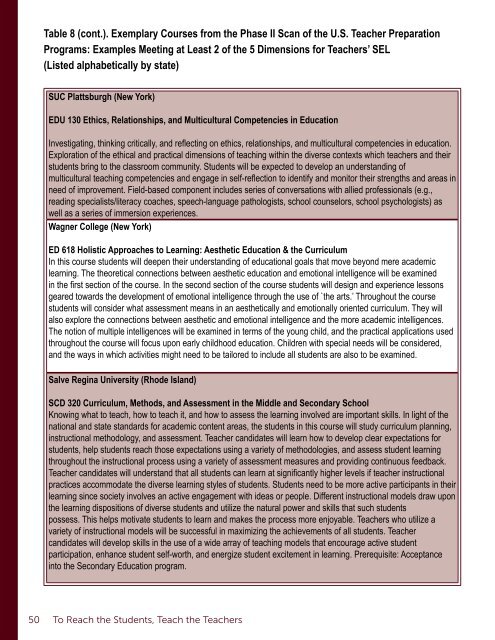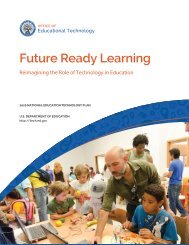SEL-TEd-Full-Report-for-CASEL-2017-02-14-R1
SEL-TEd-Full-Report-for-CASEL-2017-02-14-R1
SEL-TEd-Full-Report-for-CASEL-2017-02-14-R1
You also want an ePaper? Increase the reach of your titles
YUMPU automatically turns print PDFs into web optimized ePapers that Google loves.
Table 8 (cont.). Exemplary Courses from the Phase II Scan of the U.S. Teacher Preparation<br />
Programs: Examples Meeting at Least 2 of the 5 Dimensions <strong>for</strong> Teachers’ <strong>SEL</strong><br />
(Listed alphabetically by state)<br />
SUC Plattsburgh (New York)<br />
EDU 130 Ethics, Relationships, and Multicultural Competencies in Education<br />
Investigating, thinking critically, and reflecting on ethics, relationships, and multicultural competencies in education.<br />
Exploration of the ethical and practical dimensions of teaching within the diverse contexts which teachers and their<br />
students bring to the classroom community. Students will be expected to develop an understanding of<br />
multicultural teaching competencies and engage in self-reflection to identify and monitor their strengths and areas in<br />
need of improvement. Field-based component includes series of conversations with allied professionals (e.g.,<br />
reading specialists/literacy coaches, speech-language pathologists, school counselors, school psychologists) as<br />
well as a series of immersion experiences.<br />
Wagner College (New York)<br />
ED 618 Holistic Approaches to Learning: Aesthetic Education & the Curriculum<br />
In this course students will deepen their understanding of educational goals that move beyond mere academic<br />
learning. The theoretical connections between aesthetic education and emotional intelligence will be examined<br />
in the first section of the course. In the second section of the course students will design and experience lessons<br />
geared towards the development of emotional intelligence through the use of `the arts.’ Throughout the course<br />
students will consider what assessment means in an aesthetically and emotionally oriented curriculum. They will<br />
also explore the connections between aesthetic and emotional intelligence and the more academic intelligences.<br />
The notion of multiple intelligences will be examined in terms of the young child, and the practical applications used<br />
throughout the course will focus upon early childhood education. Children with special needs will be considered,<br />
and the ways in which activities might need to be tailored to include all students are also to be examined.<br />
Salve Regina University (Rhode Island)<br />
SCD 320 Curriculum, Methods, and Assessment in the Middle and Secondary School<br />
Knowing what to teach, how to teach it, and how to assess the learning involved are important skills. In light of the<br />
national and state standards <strong>for</strong> academic content areas, the students in this course will study curriculum planning,<br />
instructional methodology, and assessment. Teacher candidates will learn how to develop clear expectations <strong>for</strong><br />
students, help students reach those expectations using a variety of methodologies, and assess student learning<br />
throughout the instructional process using a variety of assessment measures and providing continuous feedback.<br />
Teacher candidates will understand that all students can learn at significantly higher levels if teacher instructional<br />
practices accommodate the diverse learning styles of students. Students need to be more active participants in their<br />
learning since society involves an active engagement with ideas or people. Different instructional models draw upon<br />
the learning dispositions of diverse students and utilize the natural power and skills that such students<br />
possess. This helps motivate students to learn and makes the process more enjoyable. Teachers who utilize a<br />
variety of instructional models will be successful in maximizing the achievements of all students. Teacher<br />
candidates will develop skills in the use of a wide array of teaching models that encourage active student<br />
participation, enhance student self-worth, and energize student excitement in learning. Prerequisite: Acceptance<br />
into the Secondary Education program.<br />
50 To Reach the Students, Teach the Teachers



